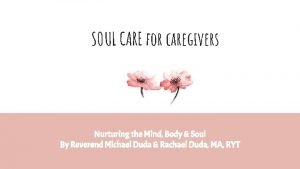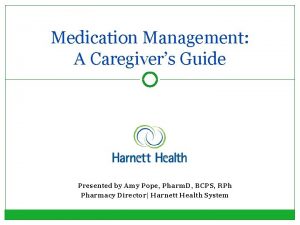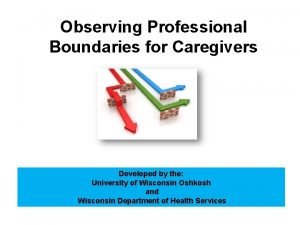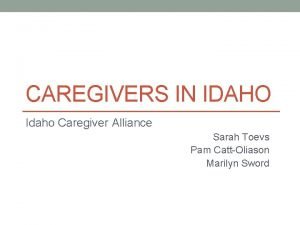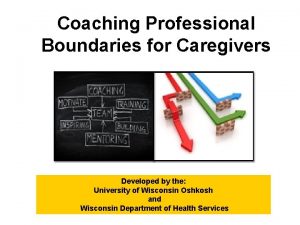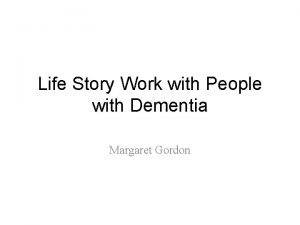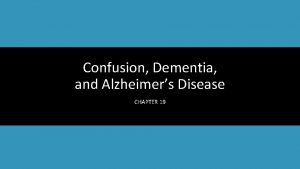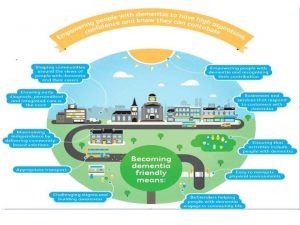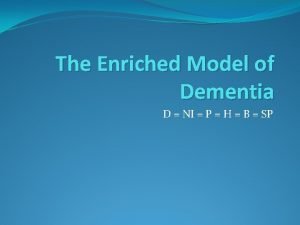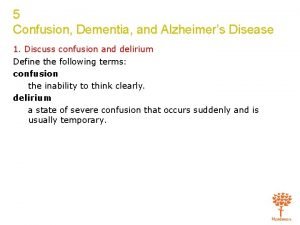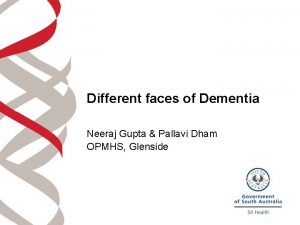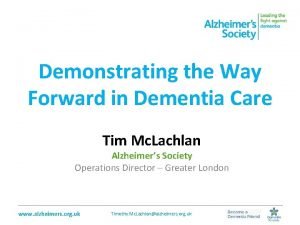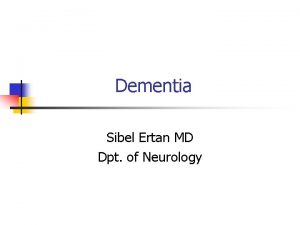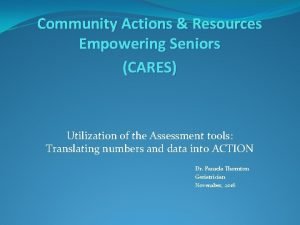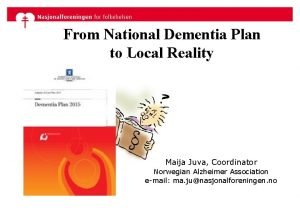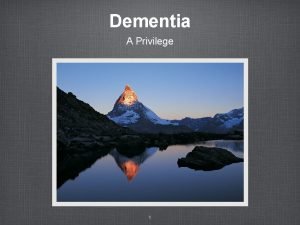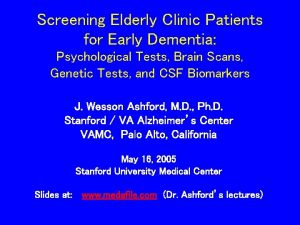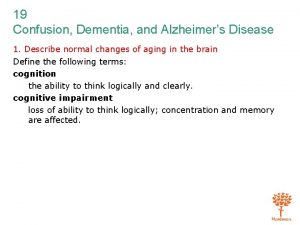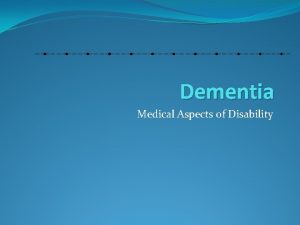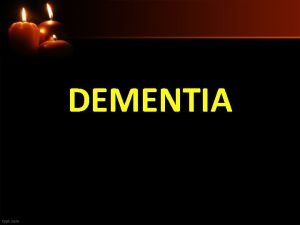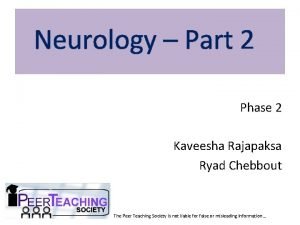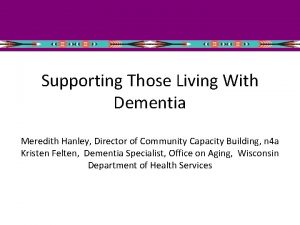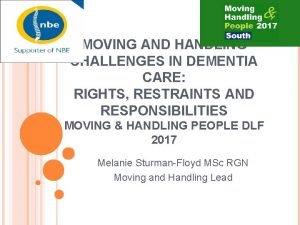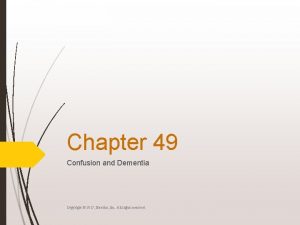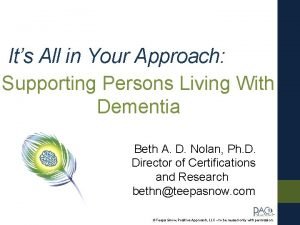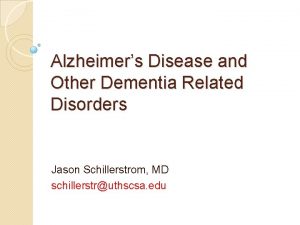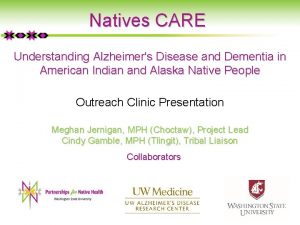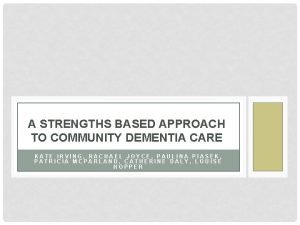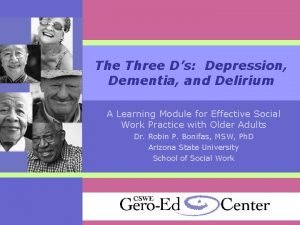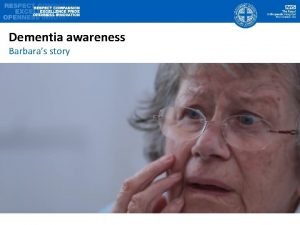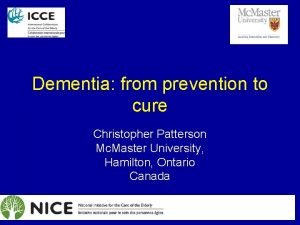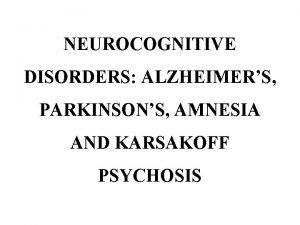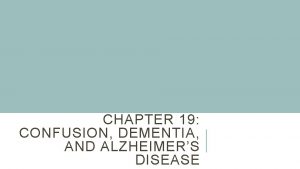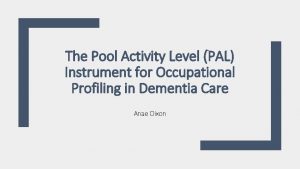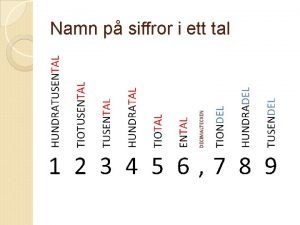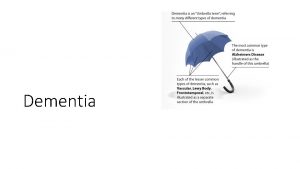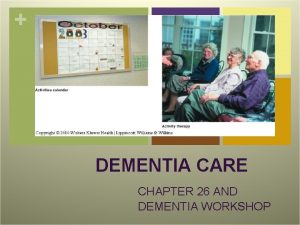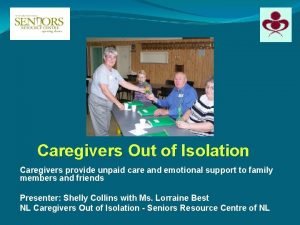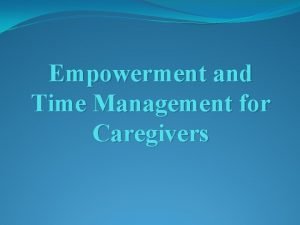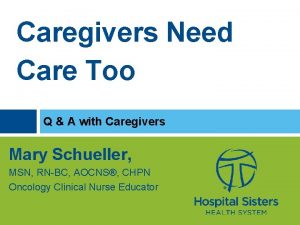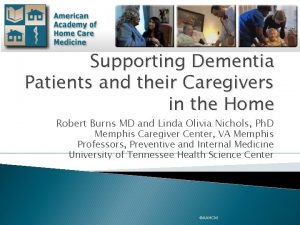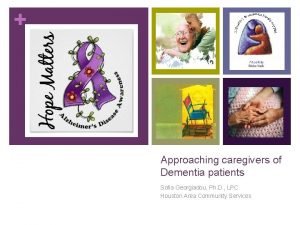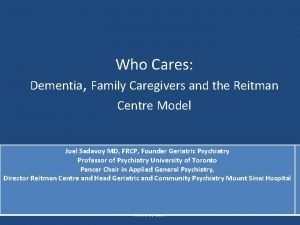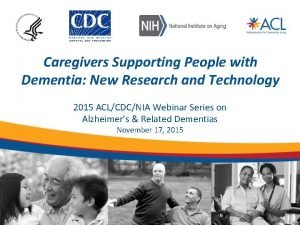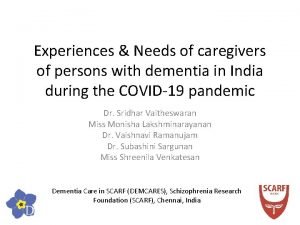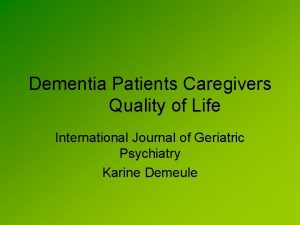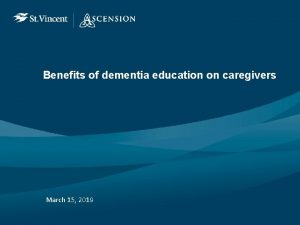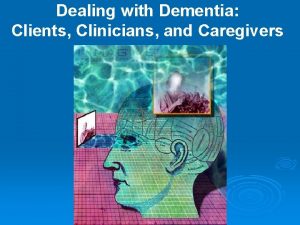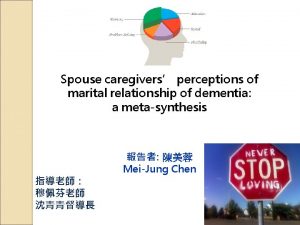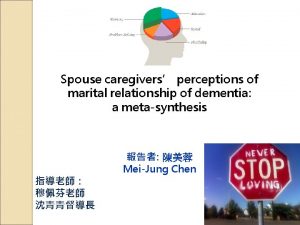Spiritual Companionship for Dementia Caregivers The Rev Jean












![It’s hard [for “self-made” people] to admit the degree to which care has made It’s hard [for “self-made” people] to admit the degree to which care has made](https://slidetodoc.com/presentation_image_h2/74a8566c7990d9317e9904dd4ee30d02/image-13.jpg)



























































- Slides: 72

Spiritual Companionship for Dementia Caregivers The Rev. Jean Denton, RN, BSN, MA jeandenton@aol. com

Holy One, We hold in the Light those who care for people with dementia. May they know patience with themselves and their loved ones, the ability to laugh at themselves and find healthy humor, willingness to forgive themselves for not being perfect, courage to engage you and boldness to wrestle with you, grace that is astounding, wisdom to love themselves, safe places for anger and outlets for tension, support from friends and family, and comfort from memories of their loved ones’ love. Give them the long view, and shield their eyes from what is trivial and petty. May your careful alchemy turn their pain into gold. May it be so. © Jean Denton

Why am I talking about dementia caregiving? © Jean Denton

© Jean Denton

And because. . . • There are more than 16, 000 people just in the US with dementia • They are marginalized in a society that o fears losing the mind and o wants to protect itself from un-fixable situations. • Every person with dementia has a primary caregiver. • Psychologists, health researchers and economists have studied dementia caregivers • Theologians have addressed the spiritual needs of people with dementia • Precious little has been done to address spiritual needs of dementia caregivers – and these are the survivors • FCN have unique access to dementia caregivers © Jean Denton

Spirituality among Caregivers Caregiver wives used symbols (“such as God”) and spiritual behaviors (such as prayer and forgiveness) as coping mechanisms. Caregivers tended to share the problems and joys of living according to their spiritual belief more often than the non-caregiver wives of healthy adults. Caregivers when compared with non-caregivers more often engaged in private prayer and sought spiritual guidance in making decisions in their everyday life. Judy Kaye and Karen M Robinson. “Spirituality Among Caregivers” Image: the Journal of Nursing Scholarship, Volume 26, Issue 3, pages 218– 221, September 1994 © Jean Denton

Objectives ü Relate various aspects of caring to dementia caregivers ü Outline the demographic, physical, social and psychological characteristics of dementia caregivers ü Assess spiritual issues of dementia caregivers ü Describe the role of the faith community nurse in addressing spiritual needs of dementia caregivers ü Identify several basic spiritual practices ü Begin to formulate ways to encourage exploration of spiritual issues with dementia caregivers ü Identify your learnings © Jean Denton

Objectives ü Relate various caregivers aspects of caring to dementia Is varied by who does it and what is done Is invisible Has ”phases” Is motivated © Jean Denton

Varied by who does it Professional Dementia Caregiver “Casual” “Informal” “Family” Dementia Caregiver May be called to do this work Didn’t sign up for this Is paid Unpaid (and it will cost money!) Educated; certified; licensed; registered No prior experience necessary; no screening done Relationship that is morphing, changing, and undefined On duty 24 hours every day Formal relationship with patient, parishioner Can walk away at the end of the shift Job description exists No job description except “Do what needs to be done” and “Use your best judgment” © Jean Denton

Preparing meals Providing transportation Varied by what is done Arranging for doctor’s appointments Shopping Managing finances Managing legal affairs Answering the telephone Helping the person take medications correctly Helping the person adhere to treatment for comorbidities Bathing Dressing Grooming Feeding Helping the person walk, transfer Managing incontinence Managing behavioral symptoms Finding and using support services Making arrangements for paid in-home, nursing home or assisted living care Hiring and supervising others who provide care Addressing family issues Managing other health conditions (comorbidities) Providing emotional support and a sense of security © Jean Denton

Caring is invisible Invisibility… refers to the difficulty in specifying or prescribing the complex of emotional and material concerns that caring entails, and the subsequent tendencies to reduce care to its visible objective tasks, and to deny the value inherent in its complexity. Peta Bowden. Caring: Gender Sensitive Ethics. London: Routledge, 1997 © Jean Denton

In our present culture there is a great ideological advantage to gain from keeping care from coming into focus. By noticing how pervasive and central care is to human life, those who are in positions of power and privilege can continue to ignore and to degrade the activities of care and those who give care. Joan C. Tronto. Moral Boundaries: A Political Argument for an Ethic of Care. New York: Routledge, 1994. © Jean Denton
![Its hard for selfmade people to admit the degree to which care has made It’s hard [for “self-made” people] to admit the degree to which care has made](https://slidetodoc.com/presentation_image_h2/74a8566c7990d9317e9904dd4ee30d02/image-13.jpg)
It’s hard [for “self-made” people] to admit the degree to which care has made their lives possible, but such an admission would undermine the legitimacy of the inequitable distribution of power, resources, and privilege of which they are the beneficiaries. Joan C. Tronto. Moral Boundaries: A Political Argument for an Ethic of Care. New York: Routledge, 1994. © Jean Denton

Caring has “phases” Caring about Taking care of Care-giving Care-receiving Joan C. Tronto. Moral Boundaries: A Political Argument for an Ethic of Care. New York: Routledge, 1994 © Jean Denton

Caring is private in the USA Think about how the US handles § Child care § Hospital care § Long-term care © Jean Denton

Caring is motivated • the desire to keep a family member or friend at home • proximity to the person with dementia • the caregiver’s perceived obligation to the person with dementia 2019 Alzheimer’s Disease Facts and Figures ALZ. ORG © Jean Denton

Motivation through a different lens • Love • Obligation (maybe includes social norms/pressure) • Duty • Commitment (maybe includes spiritual fulfillment) • Guilt Suzanne M. Cahill, “Caring in Families: What Motivates Wives, Daughters, and Daughters-in-law to Provide Dementia Care? ” Journal of Family Studies 5, no. 2, (December 7, 2014): 235– 47 © Jean Denton

Why does motivation matter? Values impact the decision to care, and in turn, the experience of caring impacts values. When motivated by a sense of duty, guilt, or social and cultural norms dementia caregivers are more likely to resent their role and suffer greater psychological distress than caregivers with more positive motivations. Motivation is complicated and influenced by many factors: cultural expectations whether or not there is reciprocity in the relationship whether or not there is a coherence between what we do and what we believe © Jean Denton

Motivated by hidden rewards? The overcommitted helper appears to eschew all personal comfort and private interest in the name of service to others. The reality, however, is often quite other. The hidden rewards are so great this seeming selflessness is a form of self-assertion, which seeks to deny the reciprocity in all acts of caring and to keep the helper firmly in the ranks of the strong and the need-free. Alistair Campbell. Moderated Love: A Theology of Professional Care. London: SPCK, 1984. © Jean Denton

Motivated by desire to grow? There is a selflessness in caring…that includes heightened awareness, greater responsiveness to the other and to myself, and the fuller use of my distinctive powers. …When I use things like trust, courage, responsibility, devotion and honesty I grow. That brings me closer to the self-actualization I can experience. It’s not that I care in order to grow, but that I grow in the process of caring. Milton Mayerhoff. On Caring. New York: Harper Collins, 1971 © Jean Denton

Implications for your role Observe broadly Listen carefully Invite openly Trust the slow work of God © Jean Denton

You might wonder If society is ashamed of caring, what does it mean for your parishioner to be doing so much caring? Cheapened? Non-productive member of society? If her community values caring, how does that make her feel? Dignified? Actualized? Does she feel invisible? Does she ever feel used? Does she ever resent what she has to do? If motivations go all the way from love, to obligation, to duty, to commitment, to guilt, what motivations do you witness? They may indicate how well she will fare. © Jean Denton

You might invite exploration • Do you ever wonder why you are doing all this caring? • How does your work of caring cause you to feel about yourself? • Does caring ever trap you? • How does your community value caring? • Who else is caring for your loved one? How are they doing it? Does this offer care to you, too? © Jean Denton

Objectives ü Relate various aspects of caring to dementia caregivers ü Outline the demographic, physical, social and psychological characteristics of dementia caregivers © Jean Denton

Demographically > 66% are female 34% are over 65 years old 50% are caring for parents 27% live with care receiver 46% live within 20 miles of the care recipient 41% live with household income of $50, 000 or less 8 -13% of all US households are “sandwich generation caregivers” 2019 Alzheimer’s Disease Facts and Figures © Jean Denton

Physically • Faster aging • Greater morbidity • Higher premature mortality © Jean Denton

Physically: Morbidity Cardiovascular problems Lower immunity and poorer immune response to vaccine Slower wound healing Higher levels of chronic conditions (such as diabetes, arthritis, ulcers, and anemia) More use of prescription medications Poorer self-rated health Decreased engagement in preventative health behaviors such as exercise Greater likelihood of smoking, drinking alcohol Poor sleep patterns Henry Brodaty and Marika Donkin. “Family caregivers of people with dementia” in Dialogues Clinical Neuroscience. 2009; 11: 217 -228 © Jean Denton

Physically: Mortality Our study suggests that being a caregiver who is experiencing mental or emotional strain is an independent risk factor for mortality among elderly spousal caregivers. Caregivers who report strain associated with caregiving are more likely to die [prematurely] than non-caregiving controls. Schulz R, Beach SR. “Caregiving as a risk factor for mortality: the Caregiver Health Effects Study. ” JAMA. 1999 Dec 15; 282(23): 2215 -9 © Jean Denton

Physically: Mortality Perceived caregiving strain is associated with increased all-cause mortality after controlling for appropriate covariates. Perkins M, Howard VJ, Wadley VG, Crowe M, Safford MM, Haley WE, Howard G, Roth DL. “Caregiving strain and all-cause mortality: evidence from the REGARDS study. ” J Gerontol B Psychol Sci Soc Sci. 2013 Jul; 68(4): 504 -12 © Jean Denton

Socially • Influence of race • Financial stress • Impact of isolation © Jean Denton

Socially: Race Compared with white Americans, African-Americans: • Identify more strongly with traditional values • Provide care in collectivist rather than individualistic caregiving systems • Score more highly on a scale of cultural justifications for caregiving, including o Perceptions of duty o Setting an example to children o Religious or spiritual beliefs o Family teachings and expectations Henry Brodaty and Marika Donkin “Family caregivers of people with dementia” in Dialogues in Clinical Neuroscience 2009; 11: 217 -228. © Jean Denton

Socially: Financial stress Compared with caregivers of people without dementia, twice as many caregivers of people with dementia indicate substantial financial difficulties. Almost 60% of dementia caregivers are also employed 66% of them reported that they missed work 8% of whom turned down promotion opportunities Up to 31% gave up work to attend to caregiving responsibilities © Jean Denton

Socially: Isolation Dementia caregivers Sacrifice their leisure pursuits and hobbies Restrict time with friends and family Give up or reduce employment © Jean Denton

Psychologically High level of stress/”caregiver burden” Depression Identity issues Conflict issues The Lazarus syndrome © Jean Denton

High level of stress, or “caregiver burden” 59% of dementia caregivers rated the emotional stress of caregiving as high or very high 18% of dementia caregivers (in contrast to only 6 percent of caregivers of people without dementia) indicate substantial negative aspects of caregiving 16% of dementia caregivers were classified in the lowest level of burden compared with caregivers of people without dementia (31%) Those more satisfied with social interactions have fewer negative psychological symptoms 2009 National Alliance for Caregiving and AARP NAC/AARP survey © Jean Denton

Depression Approximately 40 percent of dementia caregivers suffer from depression, compared with 5 to 17 percent of non-caregivers of similar ages. Rates of depression increase with the severity of cognitive impairment and with lack of reciprocity in the relationship There is more depression near the time of nursing home placement and six months following Peter A. Lichtenberg & Jeffrey T. Barth (1989) “The Dynamic Process of Caregiving in Elderly Spouses. ” Clinical Gerontologist, 9: 1, 31 -44 © Jean Denton

Characteristics independently associated with a higher risk of caregiver depression include: The person with dementia is of a younger age Has white or Hispanic ethnicity compared to African-American ethnicity Suffers from a more advanced disease process Needs more help with activities of daily living Demonstrates a behavioral problem, especially anger or aggressiveness Kenneth E. Covinsky et al. , “Patient and Caregiver Characteristics Associated with Depression in Caregivers of Patients with Dementia, ” Journal of General Internal Medicine 12 (December 18, 2003), 1006– 14 © Jean Denton

Is it… Depression? Chronic sorrow? Anticipatory grief? Pre-death grief? Ambiguous loss? © Jean Denton

Identity issues “Viewing the relationship as an extension of oneself, or high levels of couple identity, may thus help to minimize the negative effects and maximize the positive effects of the caregiving experience on caregiver mental health. ” Hoda Badra, Linda K. Acitelli & Cindy L. Carmack Taylor. “Does couple identity mediate the stress experienced by caregiving spouses? ” Psychology & Health Volume 22, Issue 2, 2007 pages 211229 YET “Loved ones who have less of themselves must have more of you. ” Howard Gruetzner, Alzheimer’s: The Complete Guide for Families and Loved Ones 2 nd ed. NY: John Wiley and Sons, 1997 © Jean Denton

Conflict issues With the care recipient With professional caregivers With themselves © Jean Denton

Often caregivers will find that their needs to care for themselves come in conflict with the care that they must give to others…. How a caregiver mediates these conflicts will obviously affect the quality of care. Joan Tronto. Moral Boundaries: A Political Argument for an Ethic of Care. New York: Routledge, 1994 © Jean Denton

The Lazarus syndrome In the advanced stages of chronic progressive disease, caregivers will see behavioral and physical changes that suggest the ordeal will be over soon. They prepare for this final separation … and loved ones keep living! Caregivers may feel angry or ambivalent. After several episodes, they may feel guilty because they wish the separation to be complete. Terese Rando. Grief, dying and Death: Clinical Interventions for Caregivers. Champaign, IL: Research Press, 1984 © Jean Denton

This is background information as you Observe broadly Listen carefully Invite openly Trust the slow work of God © Jean Denton

Objectives 1. Relate various aspects of caring to dementia caregivers 2. Outline the demographic, physical, social and psychological characteristics of dementia caregivers 3. Assess spiritual issues of dementia caregivers © Jean Denton

Veracity and “White lies” Fidelity Forgiveness of past issues before it is too late Justice: this is not fair! Abandonment by God Spiritual exhaustion Acceptance for where you are Balance Letting go Connection (adult conversation) Continuing grief Guilt at having relief Unresolved feelings toward the person Fear of the unknown When is enough? Question of WHY? And Why me? God’s silence Differences between caregiver and care-receiver religion or spirituality Hope “Keeping faith” or not Bitterness Integrity Sacrifice Isolation Intimacy Changed spiritual practices Forgiveness Change of community/supports Betrayal by God Fearing God in a different way Changed relationship with God Suffering Impending death and its meaning Need for an anchor © Jean Denton What are spiritual issues for dementia caregivers?

An attempt to categorize spiritual issues • Scared? • Sad? • Mad? • Glad? © Jean Denton

Scared: Spiritual issues that frighten • Anxiety • Fear • Worry • Emptiness • Doubt • Helplessness • Inadequacy • Vulnerability © Jean Denton

Sad: Spiritual issues that sadden • Grief • Depression • Loneliness • Remorse • Hurt • Isolation • Abandoned • Ignored © Jean Denton

Mad: Spiritual issues that offend • Anger • Blame • Resentment • Guilt • Disengaged • Feeling victimized © Jean Denton

Glad: Spiritual issues that gratify • • • Intimacy Connection Hope Gratitude Forgiveness Acceptance Virtuous Saintly Faithful Creative Resourceful © Jean Denton

Objectives 1. Relate various aspects of caring to dementia caregivers 2. Outline the demographic, physical, social and psychological characteristics of dementia caregivers 3. Assess spiritual issues of dementia caregivers role 4. Describe the of the faith community nurse in addressing spiritual needs of dementia caregivers Generally Specifically © Jean Denton

Generally: Observe broadly. Listen carefully… The body speaks the mind. What happens in the mind happens in the body. Open questions have no right or wrong answers. © Jean Denton

Generally: … Invite openly. I think I’m seeing/hearing…. Can you imagine how it would feel to find time for yourself? What would be the positives to having time for yourself? Would there be downsides to time to yourself? Can you begin to name your own needs? Are they needs to improve your caregiving or are they needs to maintain your own sanity and spiritual health? How would your caregiving improve if your own needs were met? © Jean Denton

Generally: …Trust the slow work of God. © Jean Denton

Role more specifically: Companioning No one can go it alone. Don’t abandon her! Allow space during the visit to really focus on the caregiver. Gently invite what you guess might be going on. Don’t shy away from inviting or hearing answers. © Jean Denton

Role more specifically: Allowing silence Let silence happen, though it might be against your nature. Notice your own inclination to jump into the silence, the gap, with advice or sympathy. Notice what’s going on inside you. © Jean Denton

Role more specifically: Holding hope © Jean Denton

© Jean Denton

Dementia caregivers’ fading hope In a small research study, participants • Described their hope as the possibility of a positive future within their daily, everyday lives and the limiting social context of grief and loss, stress, and fatigue and • Dealt with their fading hope by “renewing every day hope, ” simple, ordinary, small hope. Wendy Duggleby, et al “Renewing Everyday Hope: The Hope Experience of Family Caregivers of Persons with Dementia” in Issues in Mental Health Nursing Volume 30, 2009 - Issue 8 pp 514 -521 © Jean Denton

Hope may different for dementia caregivers • Smaller hopes • Hope is smaller doses • Hoping for things others might find objectionable © Jean Denton

Henri Nouwen Hope has nothing to do with optimism. Many people think hope is optimism, looking at the positive side of life. But Jesus doesn’t speak like that at all…. He describes wars, people in anguish, nation rising against nation… There’s no place that Jesus says, “One day it will all be wonderful. ” He…says, “You need to pray unceasingly that you will keep your heart focused on me. Stand with your head erect. ” Quoted by Robert A. Jonas, editor in Beauty of the Beloved: A Henri J. M. Nouwen Anthology. London: Darton, Longman and Todd, 1999. p 109, from “A Tribute to Henri Nouwen: 1932 -1996” A Windborne video production © Jean Denton

You might invite exploration • Has hope changed for you since you began this journey of dementia caregiving? • What is your experience of lost hope? Of false hope? Of real hope? • What anchors your hope? • For what do you hope now? © Jean Denton

Objectives 1. Relate various aspects of caring to dementia caregivers 2. Outline the demographic, physical, social and psychological characteristics of dementia caregivers 3. Assess spiritual issues of dementia caregivers 4. Describe the role of the faith community nurse in addressing spiritual needs of dementia caregivers 5. Identify several basic spiritual practices At home While giving care When alone When with others © Jean Denton

Spiritual Practices “It takes three things to attain a sense of significant being: God, a soul, and a moment. And the three are always here. ” Rabbi Abraham Heschel Spiritual practices are what we do to strengthen our connection with God. See “Spirituality and Practice, ” the work of Mary Ann and Fredric Brussat, on the website www. spiritualityandpractice. org © Jean Denton

Spiritual practice at home Beauty Music Nature © Jean Denton

Spiritual practice while giving care Body scan Play Mindfulness © Jean Denton

Spiritual practice when alone Lexio Meditation Sabbath © Jean Denton

Spiritual practice with others Hospitality Sharing Spiritual companionship www. sdiworld. org/seekers © Jean Denton

Objectives 1. Relate various aspects of caring to dementia caregivers 2. Outline the demographic, physical, social and psychological characteristics of dementia caregivers 3. Assess spiritual issues of dementia caregivers 4. Describe the role of the faith community nurse in addressing spiritual needs of dementia caregivers 5. Identify several basic spiritual practices encourage exploration 6. Begin to formulate ways to of spiritual issues with dementia caregivers © Jean Denton

Your homework Look at the list of spiritual issues Choose some (grief and anger are the biggies) Craft some questions that are open-ended © Jean Denton

Objectives 1. Relate various aspects of caring to dementia caregivers 2. Outline the demographic, physical, social and psychological characteristics of dementia caregivers 3. Assess spiritual issues of dementia caregivers 4. Describe the role of the faith community nurse in addressing spiritual needs of dementia caregivers 5. Identify several basic spiritual practices 6. Begin to formulate ways to encourage exploration of spiritual issues with dementia caregivers 7. Identify your learnings © Jean Denton

Take-aways and questions PLEASE contact me at jeandenton@aol. com I’d love to see the questions you come up with! And look for my forthcoming book Walking Each Other Home: Spiritual Companionship for Dementia Caregivers © Jean Denton
 Formulas movimento circular
Formulas movimento circular 1 corinthians 2:9-13
1 corinthians 2:9-13 Caregivers
Caregivers First aid for caregivers
First aid for caregivers Caregivers guide to medication
Caregivers guide to medication Professional boundaries for caregivers
Professional boundaries for caregivers Idaho caregiver alliance
Idaho caregiver alliance Observing professional boundaries for caregivers
Observing professional boundaries for caregivers Jean-gabriel monnet
Jean-gabriel monnet Jean monnet jean-gabriel monnet
Jean monnet jean-gabriel monnet Risk factor dementia
Risk factor dementia Life story work dementia
Life story work dementia Chapter 19 confusion dementia and alzheimer's disease
Chapter 19 confusion dementia and alzheimer's disease Bath city forum
Bath city forum Living well with dementia scotland
Living well with dementia scotland Dementia
Dementia Enriched model of care social psychology
Enriched model of care social psychology Rarly signs of dementia
Rarly signs of dementia Confusion dementia and alzheimer's disease
Confusion dementia and alzheimer's disease Reversible dementia
Reversible dementia 850 000 steps for dementia
850 000 steps for dementia Responsive
Responsive Symptoms of dementia
Symptoms of dementia Fast score hospice
Fast score hospice Trasodone
Trasodone Fast scale
Fast scale Dementia
Dementia Alzheimers society contented dementia
Alzheimers society contented dementia Enriched model of dementia care
Enriched model of dementia care Glycogen storage disease mnemonic
Glycogen storage disease mnemonic Dementia capable care
Dementia capable care If a resident with ad shows violent behavior the na should
If a resident with ad shows violent behavior the na should Reversible dementia
Reversible dementia Dementia is a condition characterized by
Dementia is a condition characterized by Parkinson triad
Parkinson triad Positive risk-taking dementia
Positive risk-taking dementia Dementia friendly nevada
Dementia friendly nevada Moving and handling dementia patients
Moving and handling dementia patients Dementia bookshelf analogy
Dementia bookshelf analogy Chapter 49 confusion and dementia
Chapter 49 confusion and dementia Positive physical approach
Positive physical approach Dementia pictures
Dementia pictures Difference between delirium and dementia ppt
Difference between delirium and dementia ppt Frontotemporal dementia
Frontotemporal dementia Dementia 2015
Dementia 2015 Strength based dementia care
Strength based dementia care Difference between dementia and delirium
Difference between dementia and delirium Barbara's story dementia
Barbara's story dementia Dementia treatments and interventions near patterson
Dementia treatments and interventions near patterson Types of amnesia
Types of amnesia Alzheimer's dementia
Alzheimer's dementia Dementia pugilistica
Dementia pugilistica Promoting excellence in dementia care
Promoting excellence in dementia care Confusion dementia and alzheimer disease chapter 19
Confusion dementia and alzheimer disease chapter 19 Dementie
Dementie Tom kitwood enriched model of dementia care
Tom kitwood enriched model of dementia care Rocking chair therapy for dementia patients
Rocking chair therapy for dementia patients Unit 40 dementia care
Unit 40 dementia care Pal checklist
Pal checklist Densitet vatten
Densitet vatten Var 1721 för stormaktssverige
Var 1721 för stormaktssverige Tack för att ni lyssnade bild
Tack för att ni lyssnade bild Tack för att ni har lyssnat
Tack för att ni har lyssnat Referatmarkeringar
Referatmarkeringar Smärtskolan kunskap för livet
Smärtskolan kunskap för livet Fimbrietratt
Fimbrietratt Start för skala
Start för skala Vätsketryck formel
Vätsketryck formel Multiplikation uppställning
Multiplikation uppställning Delegerande ledarstil
Delegerande ledarstil Elektronik för barn
Elektronik för barn Personalliggare bygg undantag
Personalliggare bygg undantag Toppslätskivling effekt
Toppslätskivling effekt


